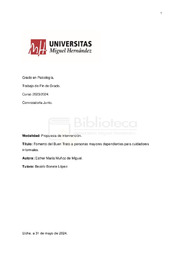Resumen :
Como consecuencia del aumento de la esperanza de vida, se ha duplicado el número de adultos mayores en los últimos 20 años (INE, 2020), y, por ende, ha aumentado el número de casos de personas mayores dependientes, siendo éste, junto con los cuidadores informales (Marmolejo, 2009), unos de los principales factores de riesgo para sufrir maltrato en personas mayores dependientes (Buitrago et al., 2005).
Asimismo, según la OMS, se ha aumentado de manera significativa el número de casos de maltrato a ancianos desde 2017, dato que seguirá aumentando debido al aumento en la esperanza de vida (OMS, 2017).
Por ello, se ha decidido desarrollar una Propuesta de Programa de Fomento del Buen Trato a personas mayores dependientes, enfocado a sus cuidadores informales. Este programa se basa en una prevención primaria de malos tratos, trabajando desde la psicoeducación en cuanto a aspectos básicos de la vejez, la proporción de estrategias de manejo de estrés del cuidador o burnout, el manejo de la solución de conflictos y la comunicación asertiva.
Para comprobar la eficacia del programa, se les administrará a los cuidadores un autorregistro ad-hoc sobre los conocimientos adquiridos en el programa, aplicándolo al inicio y fin para comprobar su eficacia. Asimismo, se administrará de igual manera el cuestionario EASI al inicio y fin del programa a los ancianos (Elder Abuse Suspiction Index, 2006), para comprobar la extinción total de maltrato.
As a consequence of increased life expectancy, the number of elderly adults has doubled in the last 20 years (INE, 2020), and, consequently, the number of dependent elderly individuals has also increased. This, along with informal caregivers (Marmolejo, 2009), is one of the main risk factors for elder abuse among dependent elderly individuals (Buitrago et al., 2005).
Furthermore, according to the WHO, the number of elder abuse cases has significantly increased since 2017, a trend that will continue due to the rising life expectancy (WHO, 2017). Therefore, it has been decided to develop a Proposal for a Program to Promote Good Treatment of Dependent Elderly Individuals, which is focused on their informal caregivers.
Therefore, it has been decided to develop a Proposal for a Program to Promote Good Treatment of Dependent Elderly People, focused on their informal caregivers. This program is based on primary prevention of abuse, working from psychoeducation on basic aspects of aging, providing stress management strategies for the caregiver or burnout, conflict resolution management, and assertive communication.
To verify the program's effectiveness, an ad-hoc self-report on the knowledge acquired in the program will be administered to the caregivers, applying it at the beginning and end to verify its effectiveness. Similarly, the EASI questionnaire (Elder Abuse Suspicion Index, 2006) will be administered at the beginning and end of the program to the elderly to ensure the complete eradication of abuse.
|
 La licencia se describe como: Atribución-NonComercial-NoDerivada 4.0 Internacional.
La licencia se describe como: Atribución-NonComercial-NoDerivada 4.0 Internacional.
.png)
